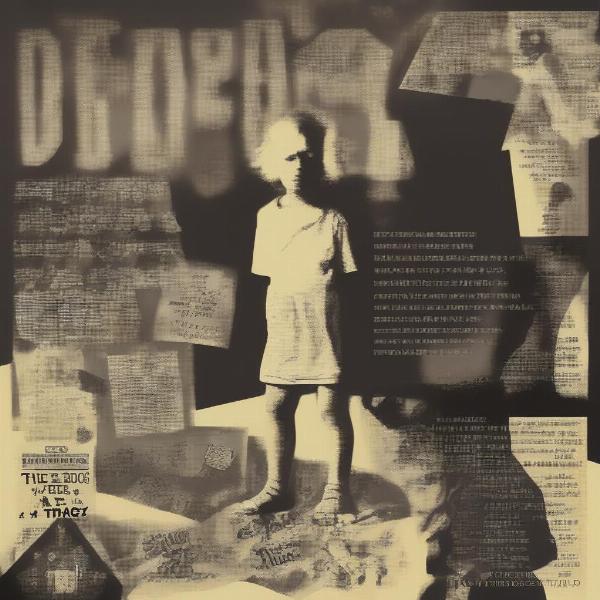The search term “dog sees god script” indicates a strong interest in Bert V. Royal’s dark comedy, Dog Sees God: Confessions of a Teenage Blockhead. While the play isn’t directly related to dog care or breeds, it leverages familiar Peanuts characters, reimagined as troubled teenagers, to explore complex themes of adolescence, identity, and loss. This article will delve into the play’s premise, explore its canine-inspired title, and discuss its relevance to the broader themes of social acceptance and self-discovery, touching upon the similar struggles we sometimes see mirrored in our canine companions.
Exploring the Dark World of Dog Sees God
Dog Sees God presents a starkly different perspective on the beloved Peanuts gang. CB, struggling with the death of his beagle, Snoopy, grapples with existential questions about life, death, and the nature of God. His grief and confusion ripple outwards, affecting his relationships with his friends, all of whom are grappling with their own adolescent anxieties. The play deals with heavy themes like sexual identity, bullying, social alienation, and drug use, providing a darker, more mature take on the childhood innocence often associated with the original Peanuts characters.
 Dog Sees God Play Poster
Dog Sees God Play Poster
Why “Dog Sees God”? The Significance of the Title
The title itself, Dog Sees God, stems from CB’s grief over Snoopy’s death. He questions the afterlife, wondering if his beloved dog has found God. This seemingly simple question becomes a metaphor for CB’s broader search for meaning and understanding in a confusing world. The canine connection, while not central to the plot, acts as a catalyst for CB’s emotional and spiritual journey. Just like dogs often mirror our own emotions, Snoopy’s death becomes a reflection of CB’s internal struggles.
Parallels Between Canine and Human Experiences
While the play focuses on human characters, the underlying themes of social acceptance, loss, and the search for identity resonate with the canine world. Dogs, like humans, can experience social anxiety, fear of abandonment, and the need for belonging. Observing a dog’s behavior, especially in new or challenging situations, can offer insights into these complex emotions.
Dog Sees God: A Controversial Masterpiece
Dog Sees God has garnered both praise and criticism. Its frank portrayal of sensitive topics and its reimagining of iconic characters have sparked debate. However, it’s this very boldness that allows the play to explore important issues often overlooked in discussions about adolescence.
Conclusion: More Than Just a Play
The search for “dog sees god script” often goes beyond a simple desire for the text. It reflects an interest in the play’s themes, its controversial nature, and its exploration of the human condition. While the canine connection might seem tangential, it serves as a powerful symbol of loss and the search for meaning in a complex world. The play’s exploration of identity, belonging, and the challenges of adolescence resonates with both human and canine experiences, making it a thought-provoking and emotionally charged piece of theatre.
FAQ:
- Is Dog Sees God related to the Peanuts comic strip? While it uses similar character names, Dog Sees God is not officially endorsed by Charles Schulz’s estate and is considered a parody.
- Where can I find the Dog Sees God script? Scripts are often available through theatrical licensing companies and bookstores.
- What are the main themes of Dog Sees God? The play explores themes of adolescence, identity, loss, sexual discovery, bullying, and social alienation.
- Why is Dog Sees God controversial? Its frank portrayal of sensitive topics and reimagining of beloved characters have sparked debate.
- Is Dog Sees God suitable for all audiences? Due to its mature themes, the play is generally recommended for mature audiences.
- What inspired the title Dog Sees God? The title comes from CB’s grief over the death of his dog and his questioning of the afterlife.
- What is the significance of the canine connection in the play? The dog represents CB’s innocence and the catalyst for his existential questioning.
Looking for more insights into dog behavior and care? Check out these related articles on ILM Dog:
(Insert links to relevant articles if available)
About ILM Dog:
ILM Dog is your go-to resource for expert advice on all aspects of dog care, from breed selection and puppy care to senior dog health and training. We offer evidence-based information and practical tips to help you navigate the joys and challenges of dog ownership. Whether you’re a seasoned dog owner or just starting your journey, ILM Dog provides the resources you need to ensure your furry friend lives a happy, healthy life. Contact us today for personalized advice and support. Email: [email protected], Phone: +44 20-3965-8624. Visit ILM Dog for more information.